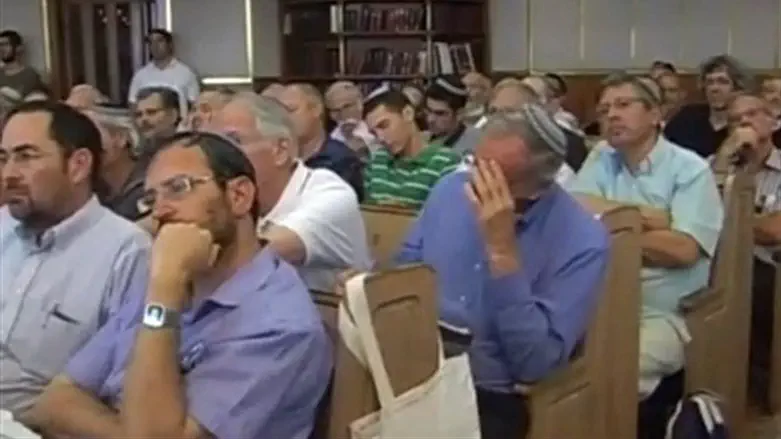
Complementing the creation of the State of Israel, the revitalization of Torah study in both Israel and the Diaspora has been pivotal to the rejuvenation of Jewry following the unfathomable horror of the Holocaust. In the Diaspora, formal Jewish education, for toddler to teenager, has been the primary antidote to assimilation and intermarriage. And, both in Israel and beyond, Jewish studies have not only taught our children of their Jewish identity, but also of its meaning and significance.
Our community’s intense focus on youth-centered Torah education is deservedly celebrated, yet it is significantly flawed. Inculcating children with both Jewish values and Torah study skills is certainly essential. We err, however, in framing Judaic studies as a formalized educational endeavor, akin to geometry and civics. Not only do students begin to view Torah as an academic exercise rather than a way of life, but they graduate with the misimpression that schooling has provided the necessary level of religious studies they will need to enjoy a meaningful religious life. The depth and sophistication of their knowledge, however, is that of a teenager. High school level biology may be adequate for most students, but not for those who intend to go on to a career in healthcare or the sciences. Similarly, a high school level understanding of Judaism is wholly insufficient for Jews seeking a meaningful, lifelong religious experience.
The legendary Chief Rabbi Avraham Yitzchok KaCohen Kook z”l, observed that in every society, in every religion, in every country, in every era throughout history, there is a remarkable inverse correlation between a community’s level of education and sophistication and the degree of its religious intensity. The more educated a community, the less vigorous its religious commitment. Is this observation not evidence, asked Rav Kook, that religion generally appeals only to the most primitive minds? Doesn’t this inverse correlation prove that we, as sophisticated individuals, should recognize the folly of a commitment to, and passion for, Torah Judaism?

Essential to a meaningful Jewish experience is ensuring that the depth and sophistication of our comprehension of Torah and religion parallels the depth and sophistication of the rest of our understandings. Rav Kook explained that every society, in every religion, in every country, in every era throughout history, provides their youth with roughly the equivalent of a third grade religious education. Consequently, in those societies in which that third grade religious education is accompanied by a third grade secular education, the youth mature into adulthood satisfied with their understanding of religion. By contrast, when a community receives a third grade religious education, but then goes on to receive a high school, university and an even more advanced secular education, they consider the simplistic nature of religion, as they had been taught, and dismiss religion as being primitive.
Rav Kook explained that every society, in every religion, in every country, in every era throughout history, provides their youth with roughly the equivalent of a third grade religious education. Consequently, in those societies in which that third grade religious education is accompanied by a third grade secular education, the youth mature into adulthood satisfied with their understanding of religion. By contrast, when a community receives a third grade religious education, but then goes on to receive a high school, university and an even more advanced secular education, they consider the simplistic nature of religion, as they had been taught, and dismiss religion as being primitive.
For this reason, Judaism mandates that Torah study be a lifelong endeavor, not merely limited to attending classes while still a child. Essential to a meaningful Jewish experience is ensuring that the depth and sophistication of our comprehension of Torah and religion parallels the depth and sophistication of the rest of our understandings. Otherwise, Torah will be understood on a far too simplistic level to provide for a full, rich religious experience.
In recent history, our community has enjoyed significantly escalating secular sophistication and education that was not been accompanied by a simultaneous increase in adult Torah study. Not only has there frequently been insufficient ongoing religious learning, even among observant Jews, but even those seeking such studies often lacked the skill set to access truly sophisticated learning. No longer is that the case. Not only has there been a renaissance in adult Torah study, among both men and women, but there is an ongoing production of myriad study tools, translations, and electronic media, as well as increasingly skilled teachers, all of which provide access to sophisticated Torah study for Jews of all religious and educational backgrounds.
The Orthodox Union is deeply committed to encouraging and facilitating greater adult involvement of all Jews in Torah study. In addition to its numerous publications, the OU has sponsored numerous adult education initiatives for Jews of all ages and backgrounds. With this in mind, three years ago, we embarked on creating the largest community-based, day long Torah event in the United States – Torah New York. This year, more than 2,500 people will join us on September 22nd at Citi Field in New York for a day of learning, offering 25 Torah classes providing all types of Torah content, styles of study and degrees of sophistication. A similar, all-day program, called Torah Yerushalayim, will be hosted by OU Israel in the Ramada Jerusalem Hotel on Sunday, October 6. A similar event, called Torah LA, is planned to take place in California in December.
The central theme of each of these programs is that ongoing Torah study is essential to a meaningful Jewish life, and that by experiencing a variety of learning topics, styles and approaches, each of us can surely discover our personal segment of Torah.
Moishe Bane is the President of the Orthodox Union, the oldest and largest umbrella organization for the North American Orthodox Jewish community
